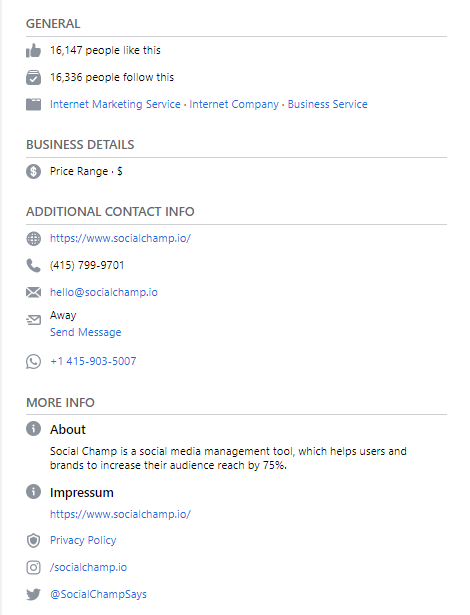Facebook Marketing for Small Business: If you’re a small business owner, you must be juggling many things at the same time. Marketing your business is one of them. Most of the time, small businesses don’t have a big budget and resources to sell their services.
Given this constraint, the best marketing channel for small business owners is social networks and online forums. No one predicted that Facebook would be such an influential platform to grow a business. If used correctly, it can be the most significant marketing asset for small businesses.
The challenge for small business owners is to know where to begin. The platform has so many features that an average business owner gets lost in the maze of ideas. From creating a content plan to deciding to auto-post on Facebook – there are a lot of tasks that need your attention.
That’s why I’ve compiled this list of the most practical, simple-to-use tips for Facebook marketing for small businesses so the owners can start promoting their products and services to a broader audience. The idea behind these Facebook tips for small business is to make sure that small business owners can execute high-return campaigns and see visible growth in revenue and customers.
Some of these Facebook tips for small business might seem a little obvious, but believe me, these are the ones that are mostly ignored. So keep your notepad with you, and start making a checklist.
Let’s begin!
13 Practical Tips for Facebook Marketing for Small Business
These Facebook tips for small business are not arranged in any particular order, and I recommend a mix and match of the techniques to find the right combination of tactics.
Dig Deeper into Ideal Customer Persona
I’m starting here by assuming that you already have a Facebook business page for your business. If not, follow my guide on creating a Facebook Business Page.
Before posting anything to your Facebook page, take a moment to paint a clear picture of your audience. Do market research, explore your competitors, and learn more about your audience.
I know you’ve already done this during the planning process, but it’s time to revisit the document for your Facebook marketing for small business. Dig deeper and find out what they like most, what they hate, their profession, location, age, gender, marital status, EVERYTHING!
The more you know about your ideal customer, the better you can target them. It will help you a lot in planning and creating content.
Once you have a clear picture in mind, you’ll create content that resonates with them.
Know the Purpose Before Posting
You can’t just post things to Facebook and hope someone sees them!
You need to consider the intent and then determine what you are going to do with that post. In other words, whether you are going to boost it or let it be a simple post on your page.
If a post is performing in terms of comments and reach, you can spend a few dollars to reach more audiences.
Use Facebook Insights to find out the time and content mix that works for your brand. Small businesses need to have a clear idea about how they interact with their audiences.
Manage your Digital Presence Efficiently
From Social Champ’s single dashboard, you can schedule posts, share videos, and measure the impact of your efforts. Try it free today.
Fill the ‘About Us’ Section
Wait, before going further, let’s check the ‘About Us’ section of your Facebook page.
Oh, that’s pretty obvious! Done. Marked Check.
Are you sure?
Many business owners miss many fields in the About Us section at the time of creating the page. Thus, this section needs a revisit every once in a while and it is a vital part when it comes to Facebook marketing for small business.
Fill out all your details, and mainly make sure that all other business social accounts are connected (or, at least, mentioned). Add buttons and call-to-action to drive traffic to your pages. While you are there, update the profile picture, cover photo, and in general, make sure everything there is up-to-date.
A complete About Us page is more search-friendly and increases the chances of your brand appearing in the Facebook search results for relevant keywords.

Remember the 3 R’s: Real, Relevant, and Relaxed
All businesses love to have a huge and active following on Facebook.
However, to gain such a following, you need to ensure that your audience sees your content as natural and relevant. This helps a lot when you start talking to your target audience through posts.
While communicating with them, you should consider three things in view:
- Speak like them
- Think like them
- Act like them
If your target audience is the to-be-mom in your locality, you need to post things they can relate to and consider your brand a good source for information and products.
You needn’t post about stuff happening on the other side of the world, things that appeal primarily to men or couples without kids.
Pro Tip: Use relevant hashtags to leverage trends.
There is a lot of educational content that you can post on your Facebook page to get their attention.
Let’s see an example here:
Mommee Coffee’s Facebook page. It’s a coffee brand for moms who are pregnant, breastfeeding, or trying to conceive. Have a look at their posts; how simple, positive, genuine, and relevant they’re! Here’s a one:
Build trust with your audience. Design your posts to appeal to your target market.
Find ways to portray your brand as funny, out-of-the-box, informational, or unique. Your unique brand identity will help you reach a large crowd on Facebook. Note that an unpromoted post would get more eyeballs than a post that promotes the brand without connecting to the audience.
Facebook Text Layout Best Practices
Don’t add too much text to your posts. Facebook used to have the 20% rule. If over 20% of the grid was text, the ad was rejected. The rule is no longer enforced now, but Facebook still prefers “little to no text” in ads and organic posts. Even if an ad is not discarded for having too much text, the ads get lower-quality scores, weaker engagement, and therefore deliver worse and cost more.
If you want to add text to your posts or ads, here are a few best practices that you can follow:
- Use the right font size (bigger font sizes can exceed the 20% rule, even if you add two or three words)
- Sum up your message in one line of the text
- Use eye-catching & impactful text
- Use alternative text overlay tools to check your text-to-images ratio before publishing.
Be Open to Feedback
Here’s to all the social media managers out there. This is one of the most important parts of Facebook marketing for small business. First of all, customer reviews are not just to boost your performance.
Negative reviews are a great way to level up your game, with some reviews often precise enough to tell you what’s wrong.
Take that feedback (which does not cost a penny), put it to good use by changing the posts’ direction and content to enhance the user experience.
Social media managers need to acknowledge the pain points of the customers and focus on solving them.
Now, small businesses don’t have large social media teams. These businesses can explore a social media management tool that fits within the budget to help with the ongoing tasks.
So ask your customers about their opinions and feedback. When customers see that the business is interested in building a genuine connection, they make an effort to recommend the business to their friends and family.
Show Off Customer Reviews
When the customer reviews are positive, it’s free advertising for the business. People will see positive reviews and will be more willing to trust your business. It’s no longer a secret that when you show off your customer reviews then it strengthens your Facebook marketing for small business.
Customer surveys play a big part in buying decisions these days, and a great rating is always good for any business.

In both cases (and especially when there’s negative feedback), you need to reply to reviews. If it requires too much effort, you should at least make sure that all negative comments are properly answered. This adds to the reputation of a business as being concerned about the customers, changing their impression of your company.
Keep up with the Ever-Changing Facebook Algorithm
Facebook marketing for small businesses organically has become more complicated, with the underlying algorithm frequently changing to accommodate emerging trends.
It’s time to start looking carefully at the analytics. You don’t need anything too fancy – Facebook’s analytics can show you which posts perform better than others.
You need to evaluate what kind of content brings in the most engagement with your followers. Do they acknowledge videos? Which blogs do they click? What topics get them moving?
Look for trends and then use the patterns for creating content that attracts more followers. Facebook has revamped the native ads system to be more accessible than ever. As a result, paid Facebook ads can be shown right in a user’s newsfeed, seamlessly mixing with organic posts while boasting better reach.
They’ve also introduced a new ad significance score (basically Quality Score for Facebook.) If you have an extensive email list, you can import your contacts (up to 5k at a time) and encourage them to join your Facebook page.
Use Relevant Hashtags
Industry-relevant hashtags can also drive more engagement to your posts. It also makes your content search-friendly. Use hashtags related to your niche and avoid generic hashtags like #Facebook or #Life. A good practice is to come up with a set of five or seven hashtags (out of these, three should be unique to your brand) that go with your content. So, when creating posts to utilize in your Facebook marketing for small business, make sure you add relevant hashtags.

Create a Positive Image by Your Profiles
Another most important & often neglected in Facebook marketing tips is using your personal accounts to advocate for your business. Even if you’re a small business owner and have a few team members, ask them to link Facebook’s business page to their accounts. Ask your employees to add where they work. You can also share a few pictures of your team members while working or at any office event. Perhaps ask them to share your page’s posts occasionally on their profiles.
Automate Your Posting Schedule
Try to have a consistent schedule for your Facebook page. Make a weekly or monthly calendar with no more than three posts per day per network.
The best way to minimize the effort and maximize the outcome is to automate the process of posting to your social networks. For this, use a social media management tool to schedule all your posts, so you don’t have to log in every time to post manually. Simply search for Facebook scheduling tools and get the one that fits your budget and requirements. This is the right time to minimize your efforts for Facebook marketing for small business.
Analyze, Change, Analyze Again!
The only way to determine with certainty if your Facebook marketing efforts are going well is to track essential metrics.
In particular, measure how efficient your efforts are, determine what’s working, and course-correct accordingly. As you fine-tune your plan, you will be able to reach a broader audience, increase leads, and experience better conversion rates.
If done right, utilizing Facebook for your business can ensure vital returns, especially for small business marketing. It’s a great way to link up with your customers and start conversations.
Keep a log of Facebook marketing for small businesses ideas that you think are working for your brand. For this, track the traffic to your Facebook page and website.
Timing is the Key
This one is an important tip for Facebook marketing for small businesses. As any marketer would tell you, Facebook’s algorithm prefers content by your friends—not content from business pages, even if you’ve liked or followed them.
The simplest way to overcome this restriction is getting as many likes, reactions, comments, and shares on your content as possible to show Facebook that your followers would like to see your content in their feeds.
To do this, go over to your Facebook analytics (called Insights), available at the top of your business page (if you have business manager access).Once there, explore the “posts” tab to see what times and days of the week most of your audience is online so that you can schedule or boost posts accordingly.
While there, look through the other available data, especially the “overview” tab, where you would find a dashboard to see all the essential stats and the month-over-month trends.
Wrapping Up!
If you’re a newbie to Facebook marketing for small businesses, it can be overwhelming. So many strategies and plans seem to do the trick that choosing the right approach can be difficult.
Using Facebook for retargeting ads to boost conversions and draw visitors to your website is a powerful strategy that could get great reach and tracking. However, this should not be the end of your planning and experimentation. You should always try new ideas and make sure you are ahead of the curve.
Happy Facebooking!






















